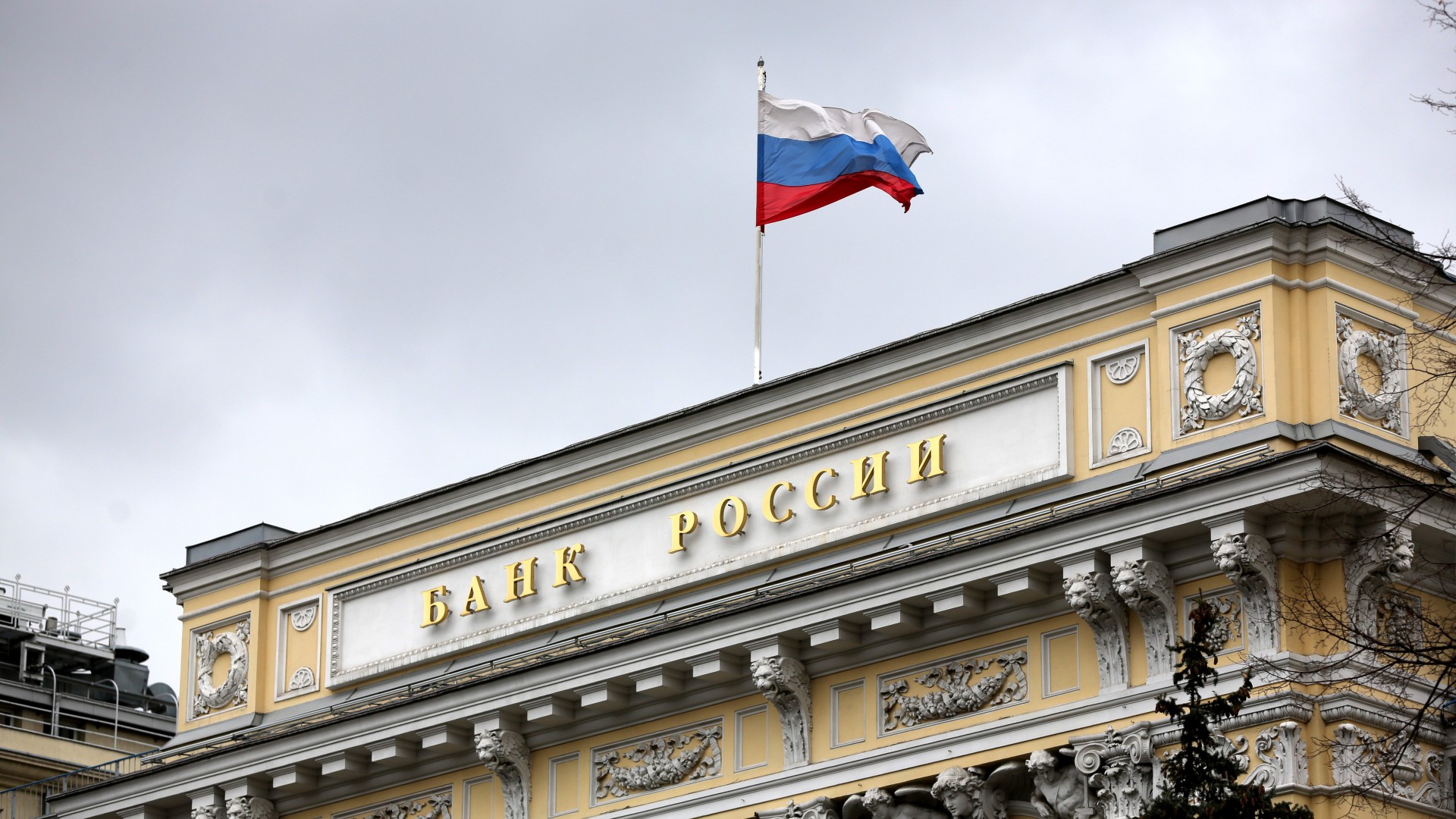Pressure builds to seize Russian assets as war in Ukraine drags on
The seizures would target Russian financial assets currently frozen by the West


A free daily email with the biggest news stories of the day – and the best features from TheWeek.com
You are now subscribed
Your newsletter sign-up was successful
Saturday will mark the two-year anniversary of Russia's invasion of Ukraine, and there appears to be no end in sight to the conflict. At the beginning of the war, Western nations froze billions of dollars in Russian assets as a cudgel against Russian President Vladimir Putin. As the war's third year approaches, pressure has been building for these nations to take the next step: the actual seizure of these assets, which would then be transferred to Ukraine to help its war effort.
The Central Bank of Russia has previously confirmed that the value of these frozen assets totals about $300 billion. While the exact makeup of these assets remains ambiguous, the funds reportedly include "$207 billion in euro assets, $67 billion in U.S. dollar assets and $37 billion in British pound assets" which were "mainly invested in foreign securities, bank deposits and nostro correspondent accounts," according to a review of the funds by Reuters.
How should Western nations go about seizing these funds — or should they be seized at all? Some experts have cautioned against the legality of seizures. Still, most nations, including the United States, appear to now be of the mindset that seizing Russia's assets is the best step to aid Ukraine.
The Week
Escape your echo chamber. Get the facts behind the news, plus analysis from multiple perspectives.

Sign up for The Week's Free Newsletters
From our morning news briefing to a weekly Good News Newsletter, get the best of The Week delivered directly to your inbox.
From our morning news briefing to a weekly Good News Newsletter, get the best of The Week delivered directly to your inbox.
A necessary step
While the White House has promised new sanctions against Russia after the death of opposition leader Alexei Navalny, the "test of seriousness will be whether President Joe Biden is willing to seize Russia's sovereign assets and transfer them to Ukraine," said the editorial board of The Wall Street Journal.
Western nations have been reluctant to seize these assets to make Putin reconsider his actions, but "there are no signs that Mr. Putin will settle for a peace short of Ukraine's capitulation," the Journal said. The debate also comes at a time when further American aid to Ukraine is held up in Congress. Since Ukraine needs additional monetary assistance to continue a counteroffensive, "Biden and Western Europe need to find money elsewhere" if the congressional infighting continues, the Journal said, and "Russian reserves are the best source."
The legal concerns around seizing Russian assets are "legitimate, but ultimately unpersuasive," Michael R. Strain, the director of economic policy at the American Enterprise Institute, said in an op-ed. "The case that asset seizure is permissible under international law as a countermeasure to Russia's aggression and destruction is compelling," Strain said. And beyond deterring further aggression, "a harsher punishment for Russia would compel other bad actors to think twice before going down the same path," Strain said.
The justifications for seizure "go beyond [a] moral argument," Leo Litra and Lesia Ogryzko said for the European Council on Foreign Relations. Russia's assets could "help Ukraine push back against Russia's aggression and rebuild and recover — and such an action from the West could dissuade other similarly inclined aggressive states from following Moscow's suit," Litra and Ogryzko said. While weighing the risks of seizure is important, "one needs to also consider the risks of not confiscating Russian sovereign assets."
A free daily email with the biggest news stories of the day – and the best features from TheWeek.com
Unintended consequences
While U.S. and European officials have reportedly held serious talks about asset seizures, trepidation remains among some experts over a pathway to do so. The argument for seizure "lacks compellent effect, it is being invoked by the wrong parties and it undermines the rules-based order western governments claim to defend," Nicholas Mulder said for the Financial Times.
The major point is that "economic reprisals are the prerogative of injured states, not of third countries," Mulder said. During periods of war, belligerents themselves can "expropriate public and private property belonging to their opponents' state and citizens," but Ukraine's Western allies "are not at war with Russia," Mulder said. This suggests the West "cannot have it both ways, claiming wartime powers while insisting they are not at war with Russia."
"Seizing Russian central bank reserves comes with economic, financial and geopolitical implications that need to be taken into account," Agathe Demarais said for Foreign Policy. Confiscating these assets would "not make a big financial difference for the Kremlin," Demarais said, as "Russia's central bank holdings are already frozen."
There should also be a look toward the future, as the seizure of assets "could set a precedent that Beijing or others could use," Demarais said. If the West decides to seize Russia's assets, "how will these states manage to convince anyone that China or India have no right to confiscate Western holdings if they so wish?"
Justin Klawans has worked as a staff writer at The Week since 2022. He began his career covering local news before joining Newsweek as a breaking news reporter, where he wrote about politics, national and global affairs, business, crime, sports, film, television and other news. Justin has also freelanced for outlets including Collider and United Press International.
-
 6 of the world’s most accessible destinations
6 of the world’s most accessible destinationsThe Week Recommends Experience all of Berlin, Singapore and Sydney
-
 How the FCC’s ‘equal time’ rule works
How the FCC’s ‘equal time’ rule worksIn the Spotlight The law is at the heart of the Colbert-CBS conflict
-
 What is the endgame in the DHS shutdown?
What is the endgame in the DHS shutdown?Today’s Big Question Democrats want to rein in ICE’s immigration crackdown
-
 Witkoff and Kushner tackle Ukraine, Iran in Geneva
Witkoff and Kushner tackle Ukraine, Iran in GenevaSpeed Read Steve Witkoff and Jared Kushner held negotiations aimed at securing a nuclear deal with Iran and an end to Russia’s war in Ukraine
-
 ‘The forces he united still shape the Democratic Party’
‘The forces he united still shape the Democratic Party’Instant Opinion Opinion, comment and editorials of the day
-
 ‘Those rights don’t exist to protect criminals’
‘Those rights don’t exist to protect criminals’Instant Opinion Opinion, comment and editorials of the day
-
 ‘The mark’s significance is psychological, if that’
‘The mark’s significance is psychological, if that’Instant Opinion Opinion, comment and editorials of the day
-
 Big-time money squabbles: the conflict over California’s proposed billionaire tax
Big-time money squabbles: the conflict over California’s proposed billionaire taxTalking Points Californians worth more than $1.1 billion would pay a one-time 5% tax
-
 ‘The West needs people’
‘The West needs people’Instant Opinion Opinion, comment and editorials of the day
-
 ‘The censorious effect is the same, even if deployed covertly’
‘The censorious effect is the same, even if deployed covertly’Instant Opinion Opinion, comment and editorials of the day
-
 Vietnam’s ‘balancing act’ with the US, China and Europe
Vietnam’s ‘balancing act’ with the US, China and EuropeIn the Spotlight Despite decades of ‘steadily improving relations’, Hanoi is still ‘deeply suspicious’ of the US as it tries to ‘diversify’ its options
